|
Nicholas J. Angarone
PP/AICP Chief Climate Resilience Officer
PO Box 420
Mail Code: 44-03A, Trenton, NJ 08625-0420
Phone: 609-322-9500
Fax: 609-292-0687
|
|
 Bureau of Climate Resilience Planning Bureau of Climate Resilience Planning
The Bureau of Climate Resilience Planning (BCRP) provides planning and technical support to New Jersey’s communities to help them make informed decisions about climate resilience. BCRP is responsible for coordinating with DEP policies, programs, and activities to plan for the impacts and the associated hazards of climate change and promote public awareness of climate change science.
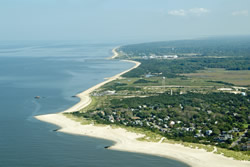
|
Resilient Coastal Communities
Resilient NJ - As part of the National Disaster Resilience Competition the United States Department of Housing and Urban Development (HUD) awarded New Jersey with a grant to advance regional planning initiatives in the nine counties designated Most Impacted and Distressed from Hurricane Sandy by HUD. The New Jersey Department of Environmental Protection (DEP) is using part of this funding to create the Resilient NJ program.
Resilient NJ will bring together municipalities and local stakeholders as Regional Teams with dynamic multi-disciplinary Consultant Teams comprised of planners, engineers, ecologists, designers, and other experts to address flood-related hazards at a regional scale in both riverine and coastal communities. The Program seeks to fund up to five innovative regional planning projects that will address gaps in resiliency planning, reach underserved and socially vulnerable populations, and enhance the value and integrity of the ecological, recreational, and economic resources in the regions through a collaborative process.
New Jersey Fostering Regional Adaptation through Municipal Economic Scenarios (NJ FRAMES) is a science-based, stakeholder-driven, regional planning project that will further advance resiliency planning in New Jersey. The multi-partner planning initiative within the Two Rivers region of Monmouth County will work with 15 communities surrounding the Navesink and Shrewsbury rivers to develop a regional plan to address the impacts of increasing coastal hazards and storm surge.
The Building Ecological Solutions to Coastal Community Hazards grant provides research, guidance, vulnerability assessments, planning and technical assistance to coastal communities with a focus on developing ecological solutions to New Jersey’s increasing coastal hazards. BESCCH also includes local government pilot projects, monitoring, secondary school engagement and citizen science training. The funding is provided by the U.S. Department of the Interior and administered by the National Fish and Wildlife Foundation as part of the Hurricane Sandy Coastal Resiliency Competitive Grant Program.
Building Ecological Solutions to Coastal Community Hazards – A Guide for New Jersey Coastal Communities (pdf, 169 Mb) is provided by The National Wildlife Federation, the New Jersey Department of Environmental Protection and the partners of the NFWF grant. “It is our hope that by highlighting ecological solutions to New Jersey’s coastal hazards, we can help coastal communities across the nation think about the role of nature in preparing for and adapting to future changes, in ways that benefit people and wildlife,” said Collin O’Mara, president and chief executive officer of the National Wildlife Federation. This guide advances practices that can help coastal communities to become safer and more sustainable in ways that work with, rather than against, nature. It describes ecological solutions to coastal community hazards, including measures to protect open space, enhance and protect coastal ecosystems (including beaches and dunes, coastal forests and shrublands, and tidal marshes) in ways that increase elevation and reduce erosion and flooding risks.” American Planning Association -New Jersey Chapter 2018 Conference – Building Ecological Solutions to Coastal Community Hazards Session
Building Ecological Solutions to Coastal Community Hazards Vulnerability Assessments
Coastal Vulnerability Index Mapping - The NJCMP developed CVI mapping for the entire coastal area in New Jersey covering 239 municipalities over four sea level rise scenarios – present day (2014), 2030, 2050, and 2100. Additionally, a CVI-based map was created for each NJ coastal community. |
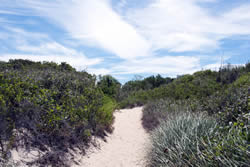 |
Coastal Management
The New Jersey Coastal Management Program provides planning and technical support to 239 NJ coastal communities in response to increasing coastal hazards. The Coastal Management Program (CMP) includes an extensive network of partners that are providing coastal communities with services such as vulnerability assessments, planning recommendations, and mitigation strategies. Much of this work is based on products developed by the CMP including the Coastal Vulnerability Index and Getting to Resilience.
The Coastal Management Program is comprised of a network of offices within the New Jersey Department of Environmental Protection that serve distinct functions yet share responsibilities that influence the state of New Jersey's coast. A primary mission of the Program is ensuring that coastal resources and ecosystems are conserved as a vital aspect of local, state, and federal efforts to enhance sustainable coastal communities. This mission is supported by a number of programs including regulation and enforcement of Department regulations, Community Sustainability and Resiliency Planning, the Clean Marina Program, Ocean Resource Planning, and Federal Consistency reviews.
Coastal Management staff develops and implements long range planning projects involving coastal resource issues, and coordinates their efforts with complementary programs having similar interests and initiatives in the coastal area. These complementary programs include the Jacques Cousteau National Estuarine Research Reserve, and three estuary programs - Delaware River, NY/NJ Harborand the Barnegat Bay, as well as the coastal programs of adjacent states. The staff also advises the Department regarding existing policies that influence coastal resource management. Staff members work with municipal, county and state government, as well as non-profit groups on planning and resource management issues. Coastal Management staff also administers Coastal Zone Management Grants and prepares grant performance reports.
More Info: Coastal Management Program Web Site |
|
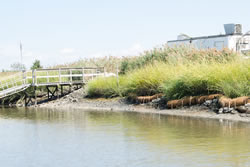 |
Living Shorelines
Staff from the Living Shoreline Program coordinates the efforts to promote and develop living shorelines in New Jersey. Working with an internal Living Shorelines Workgroup and external partners, staff will assist in project development, design, permitting and monitoring.
A living shoreline is a shoreline management practice that addresses the loss of vegetated shorelines, beaches, and habitat in the littoral zone along the coast by providing for the protection, restoration or enhancement of these habitats using plants, stone, sand, or other structural and organic materials. The use of living shoreline techniques to protect, restore and enhance our coastal shorelines will provide for more natural habitat, erosion control, improved water quality and overall resilience than traditional structural approaches.
More Info: Living Shorelines Web Site
DEP has partnered with Stevens Institute of Technology, using a grant from the Department of Housing and Urban Development, to update their Engineering Guidelines for Living Shorelines Projects (LSEG). Using the best available and most recent science, Stevens updated the LSEG with some changes to framework and parameters, as well as up to date resources and a gaps analysis. They also developed an additional guidance document, Ecoshorelines on Developed Coasts Guidance and Best Practices. As much of New Jersey’s coastline is developed, this document provides guidance on implementation options that can be applied up and down the state’s coast.
|
| |
|
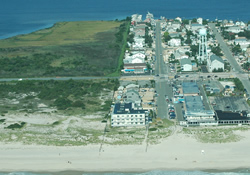 |
Other Regional and Community Planning Assistance
CAFRA Center Designation
Staff from the Land Use Planning groups, in coordination with the Coastal Management Program, oversees the identification and designation of CAFRA Centers, as regulated by the Coastal Zone Management rules (N.J.A.C. 7:7E).
State and Regional Consistency
Staff continues to represent the Department in the Plan Endorsement Process led by the NJ Office of Planning Advocacy, and remains engaged in implementation of the State Plan.
State Plan Endorsement
Staff from the Land Use Planning groups perform DEP’s portion of the Plan Endorsement review associated with the State Development and Redevelopment Plan, consistent with the Plan Endorsement rule (N.J.A.C. 5:85).
Pinelands Area
Staff coordinate land use planning efforts in the Pinelands Area with the Pinelands Commission, as designated by the Pinelands Act (N.J.S.A. 13:18A).
Sustainable Jersey
Sustainable Jersey™ is a voluntary certification program for municipalities in New Jersey that want to go green, save money, and take steps to sustain their quality of life over the long term. Staff from the Coastal Management Program, chair and staff multiple Sustainable Jersey Task Forces.
More Info: click here
|
| |
|
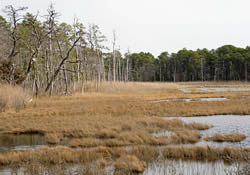 |
Other Planning Functions
Environmental Capacity-based Planning
Environmental capacity-based planning recognizes both the environmental limits and opportunities for growth. Environmental limits include drinking water availability and sewer service capacity. Opportunities include the redevelopment of brownfield sites, the preservation of open space and natural resources including rare plant and animal species and representative ecological communities.
More Info: click here
Sustainable Communities
"Sustainability" or "Sustainable Development" has been defined as development that meets the needs of the present without compromising the ability of future generations to meet their own needs. This approach recognizes the need to balance environmental quality, economic vitality and community equity as the State continues to grow and develop.
More Info: click here
|
|